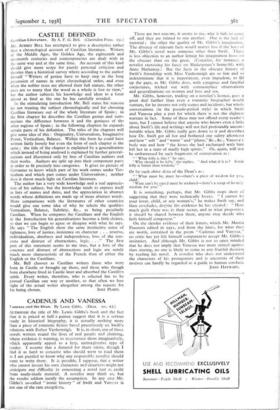CASTILE DEFINED
Castiiian Literature. By A. F. G. Bell. (Clarendon Press. 15s.)
MR. AUBREY BELL has attempted to give a descriptive rather than a chronological account of Castilian literature. Writers of the Middle Ages, the Golden Age, the eighteenth and nineteenth centuries and contemporaries are dealt with in the same way and at the same time. An account of this kind should give more scope for purely personal criticism and theories than a historical survey where according to the author himself " Writers of genius have to keep step in the long procession of names in strict chronological order, and even when the nobler trees arc allowed their full stature, the other trees are so many that the wood as a whole is lost to view," but the author subjects his knowledge and ideas to a form almost as fatal as the one he has carefully avoided.
In the stimulating introduction Mr. Bell states his reasons for not treating the subject chronologically and for choosing Castilian literature out of the whole literature of Spain ; in the first chapter he describes the Castilian genius. and sum- marises the difference between it and the geniuses of the other regions of Spain ; in the following chapters he expands certain parts of his definition. The titles of the chapters will give some idea of this : Originality, Universalism, Imaginative Power, Verticalism, Balance. Within this form he could have written fairly loosely but even the form of each chapter is the same ; the title of the chapter is explained by a generalisation which instead of being analysed is explained by further general- isations and illustrated only by lists of Castilian authors and their works. Authors are split up into their component parts in order to fit precisely into categories. It gives no picture of Cervantes to know which part of his work comes under Ver- ticalism and which part comes under Universalism ; neither does it throw much light on Castilian literature.
The author has a very wide knowledge and a real apprecia- tion of his subject, but the knowledge tends to express itself in lists of names and dates, and the appreciation in abstract words whose definitions are made up of more abstract words. More comparisons with the literatures of other countries would give one some idea of why he selects the qualities Verticalism, Balance, Subtlety, &c., as being peculiarly Castilian. When he compares the Castilians and the English in the Introduction his generalisations become a little clearer, so that we can begin to agree or disagree with what he says. He says " The English show the same instinctive sense of rightness, love of justice, insistence on character . . . reserve, individualism, aloofness and independence, love of the con- crete and distrust of abstractions, logic. . ." The first part of this statement seems to me true, but a love of the concrete and distrust of abstractions and logic are surely much more characteristic of the French than of either the English or the Castilians.
Mr. Bell chooses as Castilian writers those who were born in Castile or brought up there, and those who though born elsewhere lived in Castile later and absorbed the Castilian spirit. Every writer, therefore, who is selected has to be proved Castilian one way or another, so that often we lose sight of the actual writer altogether among the reasons for






































 Previous page
Previous page